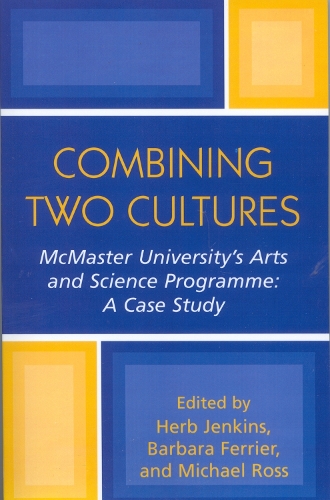
Combining Two Cultures: McMaster University's Arts and Science Programme
(Paperback)
Publishing Details
Combining Two Cultures: McMaster University's Arts and Science Programme
By (Author) Herb Jenkins
Edited by Barbara Ferrier
Edited by Michael T. Ross
Contributions by Leslie J. King
Contributions by Louis Greenspan
Contributions by Sylvia Bowerbank
Contributions by Mark Vorobej
Contributions by Graham Knight
Contributions by Jennifer Smith Maguire
Contributions by P.K Rangachari
University Press of America
University Press of America
1st August 2004
United States
Classifications
General
Non Fiction
378.01
Physical Properties
Paperback
300
Width 177mm, Height 214mm, Spine 23mm
386g
Description
Research-intensive universities have long struggled to reconcile the imperative of specialized learning with the need for a broader, more liberal education. Combining Two Cultures provides a comprehensive account of a degree program at a distinguished Canadian university, McMaster, aimed at accomplishing this synthesis.
Reviews
Since C.P. Snow coined a famous term for an old dichotomynamely, the Two Culturesattempts have been made to overcome the great divide between the humanities and the sciences in the modern university and in modern culture. Most attempts have failed topay anything more than lipservicethe divide remains enormous. But since 1981, McMaster University in Hamilton, Ontario, has put its money where its mouth is by offering the justifiably prestigious undergraduate degree programme (students selected from amongst some of the best in the country) combines a thorough liberal arts and humanities schooling intertwined witha comprehensive science education (including math, physics, and biology). Unique in its origins, the Arts and Science programme has becomea model for fully integrated science and liberal arts programmes across North America. 'Combining Two Cultures', collectively written to commemorate the 25th year of this exemplary programme, brings together past and present Arts and Sciencesfounders, instructors, directors and commentators to explore in detail the birth, history,. structure, meaning, place, and future of this uniquely integrated programme its instructional philosophy, the structure of its instruction, and its place in the u -- Gordon McOuat, Director of the History of Science and Technology Program, King's College, Halifax
Since C.P. Snow coined a famous term for an old dichotomynamely, the "Two Cultures"attempts have been made to overcome the great divide between the humanities and the sciences in the modern university and in modern culture. Most attempts have failed to pay anything more than lipservicethe divide remains enormous. But since 1981, McMaster University in Hamilton, Ontario, has put its money where its mouth is by offering the justifiably prestigious undergraduate degree programme (students selected from amongst some of the best in the country) combines a thorough "liberal arts and humanities" schooling intertwined witha comprehensive science education (including math, physics, and biology). Unique in its origins, the "Arts and Science" programme has become a model for fully integrated science and liberal arts programmes across North America. 'Combining Two Cultures', collectively written to commemorate the 25th year of this exemplary programme, brings together past and present "Arts and Sciences" founders, instructors, directors and commentators to explore in detail the birth, history,. structure, meaning, place, and future of this uniquely integrated programme its instructional philosophy, the structure of its instruction, and its place in the university and body politic. The excitement and skill of their mission jump from every page. (An interesting and delightful addition to the book is the set of responses from graduates of "Arts and Sciences" in their own words showing the program's success at producing well-rounded, confident, and socially engaged public intellectuals.) 'Combining Two Cultures' will be of much interest to those concerned about the fate of education in our modern culture, to educators and students alike, to those who are engaged in similar and hopeful enterprises, and especially tho those who, like C.P. Snow, see enormous valueindeed, urgencyin the overcoming of the 'Two Cultures' dichotomy in our modern world. -- Gordon McOuat, Director of the History of Science and Technology Program, King's College, Halifax
Author Bio
Herb Jenkins was the founding Director of the Arts and Science Program and subsequently of the Engineering and Society Program at McMaster University. Now Professor Emeritus in the Department of Psychology, he holds a doctorate in Psychology from Harvard University. Barbara Ferrier was the second Director of the Arts and Science Program and for many years led the first-year inquiry course. Now Professor Emeritus in the Department of Biochemistry at McMaster University, she holds a doctorate in Chemistry from the University of Edinburgh. Michael Ross was the first instructor of the course, Literature, in the Arts and Science Program. He is Professor Emeritus in the Department of English, McMaster University, and holds a doctorate in English from Harvard University.
